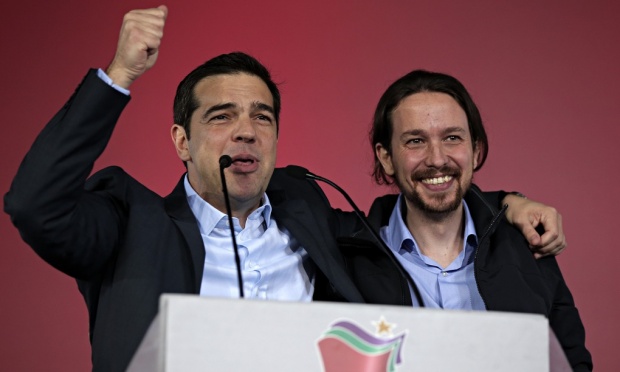Europe has been witnessing rising protests from thousands of people since 2010. The austerity measures implemented by the government in response to the Eurozone crisis, has never been welcomed by the people. An uncertain economic situation along with worsened political scenario gave way to a political change, which was highly desirable across the Eurozone nations. This led to an ascent of left party, Syriza that came into power in Greece in January 2015. Similar scenario is arising in Spain, where Podemos Party is fundamentally transforming Spain Politics.
Pablo Iglesias, leader of the newly formed party in Spain, says that austerity measures executed by Europe’s Social Democrats have resulted in widespread anger which in turn led to the formation of his party. Pablo Iglesias, who was born in 1978, entered the fields of politics at a very young age of 14 years. The university professor admires the steps taken by Syriza party to ease out the critical impact of Europe’s bailout program.
According to the results of the recent polls that took place in Spain, it is evident that Podemos party is ahead of its rival Socialist Party. This will create huge impact upon the elections taking place in later part of the year. Rising unhappiness among the people has transformed into anti-capitalists movements throughout the nation. Pablo Iglesias said that in case the Podemos party does not win the coming elections with absolute majority, then Spain will be ruled by grand coalitions. However, the Podemos party can be compared to Syriza, but Podemos had always maintained distance from anti-establishment parties on the right.
Spains’s debt of 1 trillion Euro accounts for approximately 100% of its GDP. Moreover, the interest payments are becoming a substantial burden over the country’s budget. To address this concern, Podemos has asked the EU for debt restructuring. With the aim to stimulate economic growth by increasing public spending and boosting domestic demand, he won 5 seats in European Parliamentary elections in May 2014. His election manifesto included transformation in the tax system, higher tax rates for the high income group and measures to fight tax evasions. In a presentation held in November 2014, Podemos focused on reducing the working week to 35 hours, which was similar to the policy implemented by France’s Socialist administration. The program also included implementation of new taxes on financial transactions. However, Spain’s situation is much more different than that of Greece where the left party Syriza is persistently struggling with its creditors as well as EU, about figuring a way to avoid debt defaults. Meanwhile, Prime Minister of Spain, Mariano Rajoy, stated that Spain is gradually coming out of recession and is expanding much stronger than other EU nations. During the year 2014, Spain recorded a growth of 1.4%.
Moreover, the political movements in other European nation will follow Greece and Spain which will lead to increased worries for the European Rights. The revolution by the Lefts against the Rights will continue making strides across the European Union.
Pablo Iglesias, leader of the newly formed party in Spain, says that austerity measures executed by Europe’s Social Democrats have resulted in widespread anger which in turn led to the formation of his party. Pablo Iglesias, who was born in 1978, entered the fields of politics at a very young age of 14 years. The university professor admires the steps taken by Syriza party to ease out the critical impact of Europe’s bailout program.
According to the results of the recent polls that took place in Spain, it is evident that Podemos party is ahead of its rival Socialist Party. This will create huge impact upon the elections taking place in later part of the year. Rising unhappiness among the people has transformed into anti-capitalists movements throughout the nation. Pablo Iglesias said that in case the Podemos party does not win the coming elections with absolute majority, then Spain will be ruled by grand coalitions. However, the Podemos party can be compared to Syriza, but Podemos had always maintained distance from anti-establishment parties on the right.
Spains’s debt of 1 trillion Euro accounts for approximately 100% of its GDP. Moreover, the interest payments are becoming a substantial burden over the country’s budget. To address this concern, Podemos has asked the EU for debt restructuring. With the aim to stimulate economic growth by increasing public spending and boosting domestic demand, he won 5 seats in European Parliamentary elections in May 2014. His election manifesto included transformation in the tax system, higher tax rates for the high income group and measures to fight tax evasions. In a presentation held in November 2014, Podemos focused on reducing the working week to 35 hours, which was similar to the policy implemented by France’s Socialist administration. The program also included implementation of new taxes on financial transactions. However, Spain’s situation is much more different than that of Greece where the left party Syriza is persistently struggling with its creditors as well as EU, about figuring a way to avoid debt defaults. Meanwhile, Prime Minister of Spain, Mariano Rajoy, stated that Spain is gradually coming out of recession and is expanding much stronger than other EU nations. During the year 2014, Spain recorded a growth of 1.4%.
Moreover, the political movements in other European nation will follow Greece and Spain which will lead to increased worries for the European Rights. The revolution by the Lefts against the Rights will continue making strides across the European Union.





